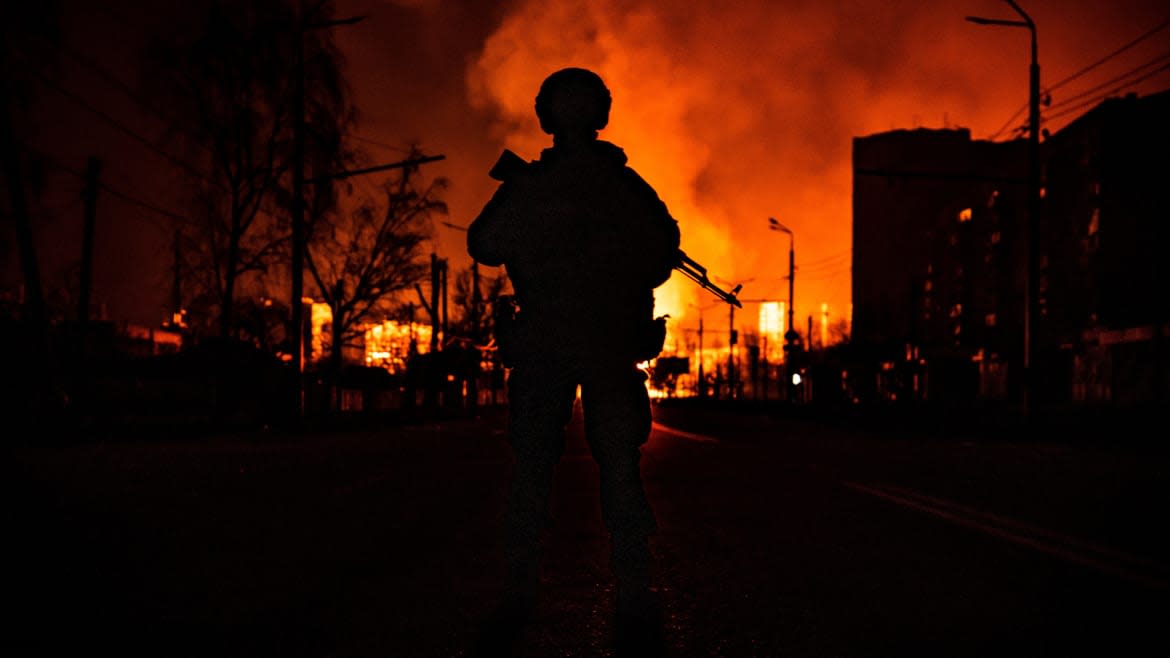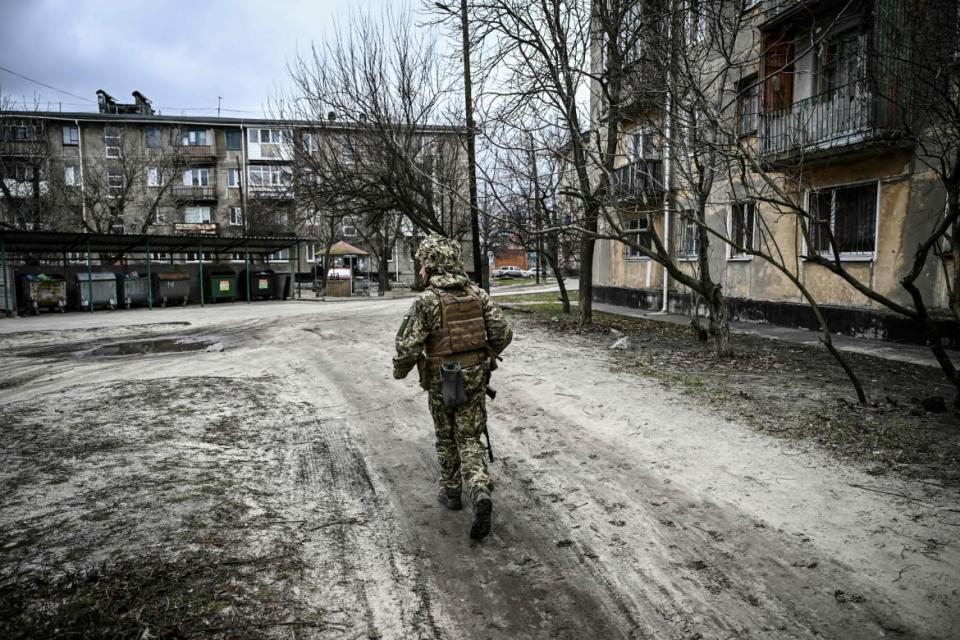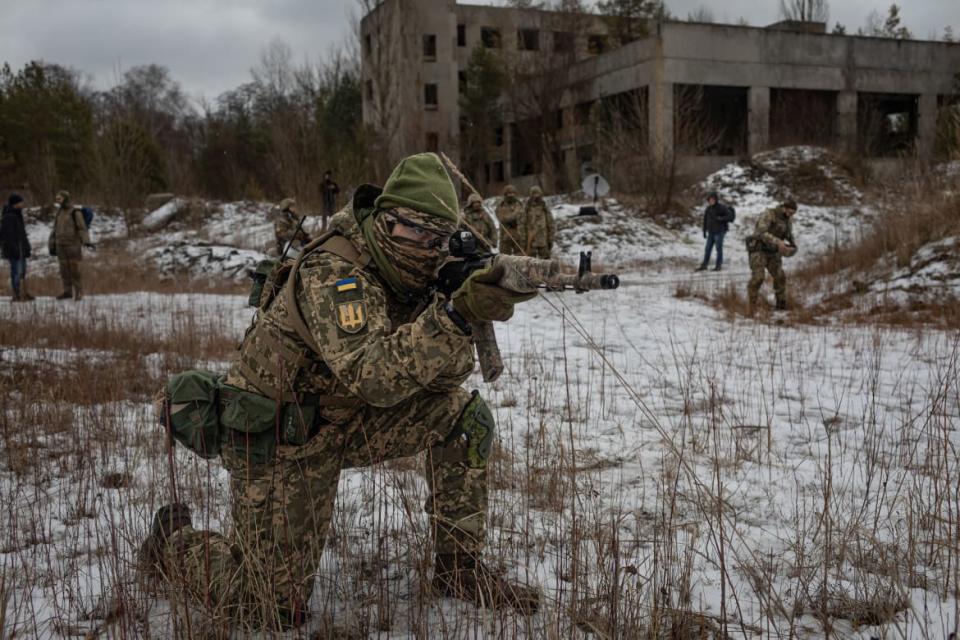New Psychological Training Op to Beat Putin’s Army Revealed

Ukraine is quietly launching a military psychological training program to combat the fear, agitation, and meltdowns racking its soldiers in the grueling war against Russia—in the hope that it will translate into more victories on the battlefield, The Daily Beast has learned.
Now that the ruthless invasion is approaching its eleventh month, the focus of the psychological training courses is to teach Ukrainian fighters to recognize symptoms of combat stress in their peers and equip them to intervene in mental health crises, the military psychologist in charge of the program, Rodion Grigoryan, said in an exclusive interview.
“When full-scale invasion started lots of people who had no previous military experience they enrolled. And so they have no military nor psychological training. Their stress resistance, resilience, was really low,” Grigoryan, accompanied by a translator, told The Daily Beast on a phone call this month. “People have had no understanding of the mental state they could get into during combat.”
The mental health help that has been available to Ukrainian fighters has been subpar for some time now he said—and Grigoryan has had a front row seat to the problem. He volunteered to fight in Ukraine’s territorial defense forces in the early days of the war, and before that, had served in Ukraine’s national guard.
Many Ukrainians working to beat Russia are volunteers, which means that they jumped into the horrors of the battlefield with little to no experience managing combat stress. Even veterans have been struggling with the lack of mental health support since the war started in February, Grigoryan explained.
Trapped Ukrainian Woman Watched Her Backyard Turn Into a Mass Murder Scene
“Some people who had previous combat experience, they already had their own experience, some understanding of what the states could be, what reactions can be felt in combat,” Grigoryan told The Daily Beast. But “when I ask them about the experience, I learn that the help they are getting is not effective enough.”
Although Ukraine has secured a slew of battlefield victories in recent weeks, the launch of the program shows that authorities are keenly aware of how combat stresses can get in the way of effective war fighting. With manpower on Russia’s side, Ukraine can’t afford to have soldiers falling apart on the battlefield.
“Men can be frozen,” if they’re not prepared for these situations, Grigoryan explained, adding that “this psychological training is very much needed.”
Mental health programs that intervene during the war can help Ukraine in the long run, too, as it may limit the number of Ukrainian fighters that develop post-traumatic stress disorder (PTSD) down the line, according to Neil Greenberg, a PTSD and military mental health expert who has trained Ukrainian fighters.
“If you don’t address or properly address the psychological challenges of what they’re doing now, then you’re going to get troops more likely to develop mental health problems, like depression and substance misuse and PTSD,” Greenberg, a professor at King’s College London, told The Daily Beast. “That’s going to degrade your capacity to keep on fighting.”
Although the justification for the training courses may sound compelling to military strategists, getting approval for the program hasn’t been easy. Grigoryan has run into some resistance from an organizational perspective and from the soldiers themselves who have, in some cases, been ashamed about asking for help, he said.
“There are some stereotypes and biases in this society about psychological help,” Grigoryan said. “There’s a common thought that if you are addressing a psychologist, that you’re not normal, something is wrong with you. We had people who were shy and nervous about how that would impact their reputation and their social status.”

A Ukraine army soldier walks in the town of Schastia, near the eastern Ukraine city of Lugansk, on February 22, 2022, a day after Russia recognised east Ukraine's separatist republics and ordered the Russian army to send troops there as "peacekeepers."
The first part of the training includes a conversation about breaking down those stigmas, Grigoryan said. A second portion of the training includes practical exercises, learning the different kinds of mental combat stresses and their signs, and instruction on how to intervene with others when they are experiencing a crisis.
The North Atlantic Treaty Organization (NATO) is helping to coordinate the program with financial and programmatic support, a move NATO took after Ukraine requested aid to develop better military psychological resilience, NATO spokesperson Oana Lungescu told The Daily Beast.
“Following Russia’s invasion and at the request of Ukraine, NATO has put in place assistance to enhance the psychological resilience of military service personnel and develop a mental health system for Ukrainian combatants and veterans,” Lungescu said.
The peer-oriented system Ukraine is working on is in some ways tried and true, said Greenberg, who has helped implement a similar program in the U.K.’s armed forces. Known as Trauma Risk Management (TRiM), it’s focused on dampening long term negative impacts of combat events for soldiers by training military peers to understand the ways traumatic events can impact people’s mental health and to step in when needed.
With this program, “the evidence we gathered while researching at King’s College London shows you’re more likely to go and seek professional help, you’re less likely to have problems, you’re less likely to have degraded performance,” Greenberg told The Daily Beast. “These peer support systems like trauma risk management, (TRiM), are really a useful tool to help the military keep on going when they're facing difficult situations.”
Some of the peculiarities of the war in Ukraine leave particularly harsh scars. Russia’s lack of precise military technology and accuracy has made dealing with attacks difficult, Greenberg said.

Ukrainian reservist take part in training with "Territorial Defense Forces just outside the capital city of Kyiv as Russian military forces continue to mobilize on the Ukrainian border.
“[I] hear from the battlefield… things are horrible out there and particularly when it comes to artillery and these drone attacks, it’s the unpredictability of warfare that causes the most psychological difficulties,” Greenberg said. “Artillery and drones and unpredictable, non-defensible attacks are much more psychologically difficult because you could be the best soldier in the world, but if an artillery shell lands somewhere near you, there's nothing you can do about that.”
While intervention now is extremely important, planning for Ukrainian fighters’ reintegration into society when the war is over is just as important. Kyiv is now working on building mental health support for veterans after the war, according to Ukraine’s Ministry of Veterans Affair.
But in many cases, soldiers won’t be returning home to stable environments. Their family members, in all likelihood, may have experienced or witnessed atrocities themselves, which might make healing and reintegration mystifying for some, according to Greenberg.
“They’re not flying into a war zone during the battle and then coming home to normality,” Greenberg said. “If the soldier comes back to a family that had some of the kids that have been killed by rockets or there’s been atrocities where they are, that’s going to also affect the soldiers’ mental health.”
Between dealing with the stress of countless missile attacks and the trauma of horrific torture sessions, tough mental health issues still lie ahead for Ukrainian survivors of the war, according to Aditi Nerurkar, a doctor with expertise in stress and resilience.
For Ukrainian fighters, ten months into the war is no longer acute stress, but chronic stress, said Nerurkar. While some of the soldiers may seem to be doing well now, they may reach a boiling point when they are away from the combat zone, Nerurkar warned.
“We as humans are incredibly capable and we have this ability to rise up to meet the moment so you might not see a bunch of the mental health challenges or symptoms. It might look like they really have it together,” Nerurkar told The Daily Beast. “But often immediately afterwards—when they are out of harm’s way, their stress response starts to go down, they feel a sense of safety again—is when a lot of these mental health issues come up.”
Although an end to the war seems elusive, Ukraine’s forces are planning to rotate this winter, when Kyiv expects a slowdown in fighting, according to Ukraine’s Ministry of Defense. As a result, many fighters will have a moment to regroup and process their combat traumas.
“From a clinical standpoint I am deeply concerned… we are going to see a tremendous amount of fallout from this,” Nerurkar added. “If we think of the brain as a tea kettle, where’s that valve to release that steam? There is none. It’s been ten months. There is no respite. We need that respite.”
Get the Daily Beast's biggest scoops and scandals delivered right to your inbox. Sign up now.
Stay informed and gain unlimited access to the Daily Beast's unmatched reporting. Subscribe now.

